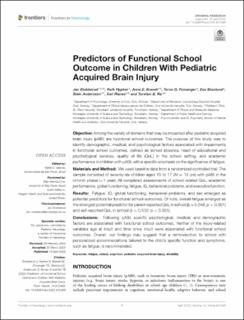| dc.description.abstract | Objective: Among the variety of domains that may be impacted after pediatric acquired brain injury (pABI) are functional school outcomes. The purpose of this study was to identify demographic, medical, and psychological factors associated with impairments in functional school outcomes, defined as school absence, need of educational and psychological services, quality of life (QoL) in the school setting, and academic performance in children with pABI, with a specific emphasis on the significance of fatigue.
Materials and Method: We used baseline data from a randomized controlled trial. The sample consisted of seventy-six children aged 10 to 17 (M = 13 yrs) with pABI in the chronic phase (>1 year). All completed assessments of school-related QoL, academic performance, global functioning, fatigue, IQ, behavioral problems, and executive function.
Results: Fatigue, IQ, global functioning, behavioral problems, and sex emerged as potential predictors for functional school outcomes. Of note, overall fatigue emerged as the strongest potential predictor for parent-reported QoL in school (β = 0.548; p < 0.001) and self-reported QoL in school (β = 0.532; p < 0.001).
Conclusions: Following pABI, specific psychological, medical, and demographic factors are associated with functional school outcomes. Neither of the injury-related variables age at insult and time since insult were associated with functional school outcomes. Overall, our findings may suggest that a reintroduction to school with personalized accommodations tailored to the child's specific function and symptoms, such as fatigue, is recommended. | en_US |

